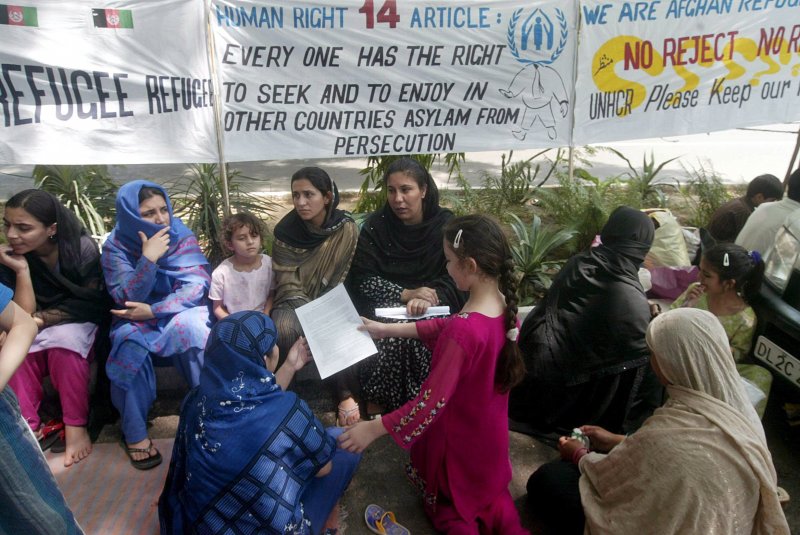NEW DELHI: The UNHCR celebrated World Refugee Day on 20 June.
India has a long history of providing refuge to those fleeing persecution, conflict, and violence. Despite not being a signatory to the 1951 Refugee Convention, India has demonstrated a profound commitment to protecting refugees and asylum-seekers. India’s tradition of providing refuge dates back to ancient times, when people from various cultures and faiths sought sanctuary in the country. The Jews, fleeing persecution in the Roman Empire, found refuge in India after the destruction of the Second Temple in Jerusalem. The Parsis, fleeing persecution in Iran, arrived in India in the 10th century CE and were welcomed with open arms. In the medieval period, Persian-speaking Muslims fleeing the Mongol invasions of Persia found refuge in India, contributing significantly to Indian culture.
The Bahais, fleeing persecution in Iran, also found a new home in India, where they could practise their faith freely. The magnificent Lotus Temple of the Bahais has more visitors than the Taj Mahal. The 1971 Bangladesh Liberation War saw nearly 10 million refugees seek safety in India, despite lacking a formal refugee policy or international obligations. India opened its borders, providing shelter, food, and medical aid, exemplifying its humanitarian spirit. Sri Lankan refugees, especially Tamil people, were displaced by the Sri Lankan civil war and went to India as a safe place. This is a burden shared between UNHCR in India and the Indian government, which, among others, guarantees protection, basic needs and an opportunity for self-reliance of these refugees. This partnership even extends further, as far as such enduring solutions as reparation to the willing or integration into the Indian society.
India and the UNHCR have a complex relationship when it comes to refugee issues. Disagreements arise due to India not being bound by international refugee law, leading to differing interpretations of refugee rights and obligations. This affects how refugee status is determined and the extent of protection offered. Understanding why people flee their homes is essential for addressing the refugee crisis effectively. Individuals become refugees due to persecution based on race, religion, nationality, or political opinion, or due to armed conflicts and civil wars. This influx of refugees can significantly impact a host country’s social, economic, and political fabric, straining resources and infrastructure. India has demonstrated its willingness to provide refuge in times of crisis, as exemplified by its response to the Sri Lankan and Bangladesh refugee situations.
However, the security concerns associated with large-scale refugee movements cannot be overlooked. To strike a balance between humanitarian obligations and security concerns, India can further enhance its support for the UNHCR by formalizing refugee protection frameworks and increasing financial contributions. The UNHCR, in turn, can publicly acknowledge India’s efforts and highlight success stories of refugees supported by India.
Both entities must collaborate to distinguish between refugees fleeing persecution and economic migrants seeking better opportunities. This requires enhanced border management, rigorous screening procedures, and increased information sharing between India, neighbouring countries, and the UNHCR. Engaging local communities in refugee integration efforts can also foster understanding and address security concerns. India, with its limited resources, often prioritises voluntary repatriation or local integration over UNHCR’s preferred solution of resettlement. Additionally, data sharing and funding issues create friction
According to the UNHCR, as of 31 January 2022, there are over 46,000 refugees and asylum-seekers registered with them in India, primarily from Myanmar and Afghanistan. The UNHCR-India’s collaborative network with nine national NGOs, including Gandhi National Memorial Society, Sphere Network, Bal Raksha Bharat (Save the Children), ActionAid, BOSCO, SLIC, DAJI, ADRA, and CHRI, creates a robust framework for refugee protection in India. This partnership model leverages the strengths of both the UNHCR and local NGOs, allowing for a comprehensive approach to addressing the complex needs of refugees and asylum-seekers.
For the UNHCR, these partnerships provide invaluable on-ground support, local expertise, and cultural understanding, enabling them to deliver targeted and effective assistance. For the NGOs, collaboration with the UNHCR offers access to funding, technical resources, and international recognition, amplifying their impact and reach.
To build upon this successful model, further collaboration and investment are essential. This includes expanding the network of partner NGOs to cover more geographical areas and diverse needs, strengthening capacity-building initiatives for NGOs, and promoting knowledge sharing and best practices across the sector. Additionally, exploring innovative funding mechanisms and engaging the private sector can ensure sustainable and scalable support for refugees and asylum-seekers in India.
On the multilateral front, Government of India has consistently provided support to the UNRWA. Recently, it increased its funding to UNRWA, reaching $27.5 million in total contributions since 2018. This funding supports vital services like education, healthcare, and relief for Palestinian refugees. While not a signatory to the Refugee Convention, Government of India has provided operational space for UNHCR. India’s humanitarian efforts extend beyond these agencies. India has been a significant contributor to humanitarian aid efforts on the bilateral front, with notable contributions of medical supplies, food aid, and financial assistance to countries affected by various crises. These actions demonstrate India’s commitment to international cooperation and its growing role in global humanitarian aid.
India, with its civilizational history of providing asylum, can further enhance its support for the UNHCR by formalizing its refugee protection framework, increasing financial contributions, and sharing expertise in areas like disaster management and healthcare. The UNHCR, in turn, should celebrate India’s consistent contributions through public recognition, highlighting success stories, and organizing joint events.
By adopting these comprehensive measures, India can uphold its humanitarian traditions, reinforce its commitment to refugee protection while safeguarding national security. This collaborative approach not only benefits those seeking refuge but also contributes to regional stability and upholds India’s humanitarian standing and international reputational while world over gates are being slammed in the face of the influx.
Col (Dr) Divakaran Padma Kumar Pillay (Retd) is Research Fellow, Manohar Parikkar Institute for Defence Studies and Analyses. Dr Kazem Samandari is Executive Chairman, L’Opéra; Co-Founder, Trajectories of Hope Foundation.

